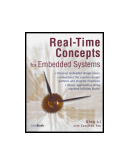Книга: Real-Time Concepts for Embedded Systems
8.3.2 Typical Event Register Operations
8.3.2 Typical Event Register Operations
Two main operations are associated with an event register, the sending and the receiving operations, as shown in Table 8.5.
Table 8.5: Event register operations.
| Operation | Description |
|---|---|
| Send | Sends events to a task |
| Receive | Receives events |
The receive operation allows the calling task to receive events from external sources. The task can specify if it wishes to wait, as well as the length of time to wait for the arrival of desired events before giving up. The task can wait forever or for a specified interval. Specifying a set of events when issuing the receive operation allows a task to block-wait for the arrival of multiple events, although events might not necessarily all arrive simultaneously. The kernel translates this event set into the notification conditions. The receive operation returns either when the notification conditions are satisfied or when the timeout has occurred. Any received events that are not indicated in the receive operation are left pending in the received events register of the event register control block. The receive operation returns immediately if the desired events are already pending.
The event set is constructed using the bit-wise AND/OR operation. With the AND operation, the task resumes execution only after every event bit from the set is on. A task can also block-wait for the arrival of a single event from an event set, which is constructed using the bit-wise OR operation. In this case, the task resumes execution when any one event bit from the set is on.
The send operation allows an external source, either a task or an ISR, to send events to another task. The sender can send multiple events to the designated task through a single send operation. Events that have been sent and are pending on the event bits but have not been chosen for reception by the task remain pending in the received events register of the event register control block.
Events in the event register are not queued. An event register cannot count the occurrences of the same event while it is pending; therefore, subsequent occurrences of the same event are lost. For example, if an ISR sends an event to a task and the event is left pending; and later another task sends the same event again to the same task while it is still pending, the first occurrence of the event is lost.
- 8.3.1 Event Register Control Blocks
- 8.3.3 Typical Uses of Event Registers
- Generalized identity operations
- Heap operations
- Arithmetic operations
- Паттерн Event
- 8.5.2 Typical Condition Variable Operations
- EVENT MEMORY SIZE
- 11.7 Soft Timers and Timer Related Operations
- КЛЮЧЕВЫЕ СЛОВА: auto, extern, static, register
- Registering the Domain
- 2.2.1. Typical Embedded Linux Setup




